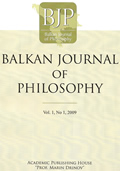The neopositivist trend in the Finnish school of philosophy
The neopositivist trend in the Finnish school of philosophy
Author(s): Mihai D. VasileSubject(s): Philosophy
Published by: Институт по философия и социология при БАН
Keywords: empiricism; neopositivism; the Finnish school; ars cogitandi; Eino Kaila
Summary/Abstract: Ars cogitandi is not the monopoly of a school, a people or an age, but it has crossed over the centuries and cardinal points, from the Platonic Academy of Athens to the Finnish University set up at Turku in 1640 and set down for good and for all at Helsingfors (the ancient name for Helsinki) in the year 1828. Ars cogitandi as philosophy got here as a distinct brilliance following the classical Anglo-Saxon tradition of empiricism, represented at that time by Edward Westermarck (1862–1939), who was professor of practical philosophy in Helsinki and professor of sociology at London School of Economics from 1907 until 19301. The Finnish School of Philosophy acquired its decisive acknowledgement by Eino Kaila, great scholar and chief of the school, who brought over to Finland the modern logic and the philosophy of the Vienna Circle.
Journal: Balkan Journal of Philosophy
- Issue Year: III/2011
- Issue No: 2
- Page Range: 213-220
- Page Count: 8
- Language: English

